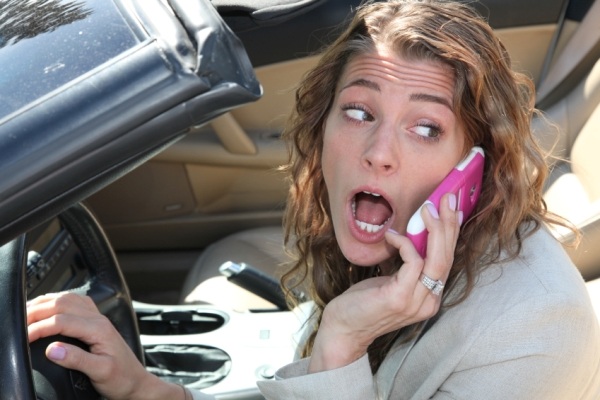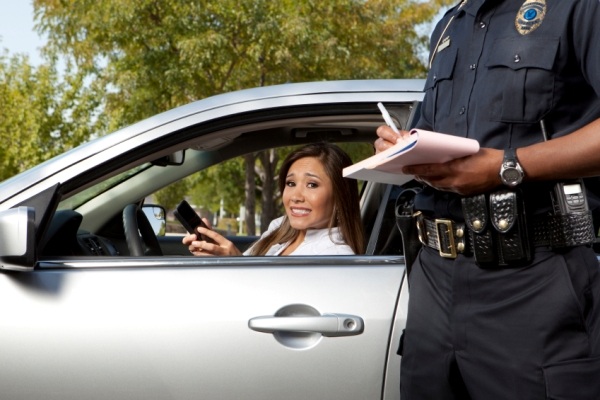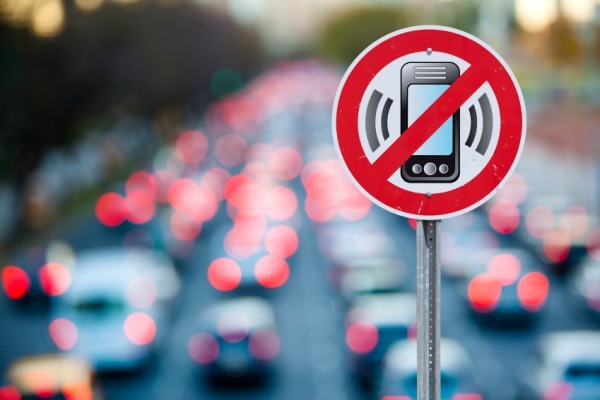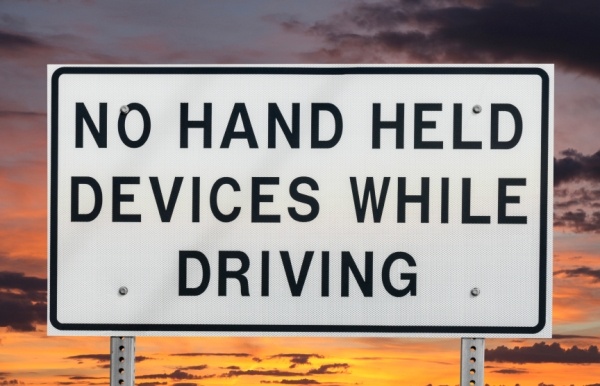Georgia in July became the 16th state to enact a hands-free cellphone law, making it illegal to hold your phone while driving, in a move meant to put some teeth into its existing driver texting ban. in 2010, Georgia banned texting and driving, but motorists were still allowed to use their hands to dial, which critics say made the law hard to enforce.
Georgia's recent legislation comes at a time when distracted driving is a major issue out on the roads. According to data from the National Highway Traffic Safety Administration (NHTSA) there were 3,450 deaths related to distracted driving in 2016. An additional 391,000 were injured due to distracted driving.
Laws regarding distracted driving vary by state. While the majority of states, 47 plus D.C., have laws in place that ban texting and driving, many states still allow drivers to talk on a phone behind the wheel. Most states also have different laws that pertain to young and inexperienced drivers.
Distracted driving laws can be complicated and if you receive a ticket for texting or talking behind the wheel it can impact your insurance rates. Many drivers are unaware of what exactly is legal in their own state when it comes to talking, texting and driving.
We compiled the lists below to show what the law is in each state as well as the fine you can expect if you are pulled over with a phone in your hand.

Will a cellphone ticket raise my car insurance rates?
A texting ticket will raise your rates, on average, by 24 percent, according to a rate analysis showing
how much insurance goes up for a texting ticket by CarInsurance.com, though it could be as low as four percent or as high as 30 percent, depending on your state laws and driving record, among other factors.
 "If the infraction goes on your driving record, assume you can get surcharged by insurers, raising your premium," warns Penny Gusner, consumer analyst for CarInsurance.com. "Insurers check your driving record when writing new policies, and typically every six months upon renewal, and will factor in any driving infractions using their own point system," she continues.
"If the infraction goes on your driving record, assume you can get surcharged by insurers, raising your premium," warns Penny Gusner, consumer analyst for CarInsurance.com. "Insurers check your driving record when writing new policies, and typically every six months upon renewal, and will factor in any driving infractions using their own point system," she continues.
The rate hike will vary by insurer, but in the majority of cases it would be treated as a minor violation such as a low-level speeding ticket or running a red light. "Normally a rate increase will be the same as any other first infraction," says Gusner.
If you experience a sharp rate increase after a cellphone ticket, you may want to
compare car insurance rates from other insurers. You'll probably find that some insurers are more forgiving than others when you shop around, she says.
Cellphone bans and license points by state
| State | Texting ban | Talking ban | License points? |
|---|---|---|---|
| Alabama | Yes | No | Yes - 2 points on license |
| Alaska | Yes | No | No |
| Arizona | No | No | No |
| Arkansas | Yes | School or Construction Zones | No |
| California | Yes | Yes | No |
| Colorado | Yes | No | Yes - 4 Points |
| Connecticut | Yes | Yes | No |
| Delaware | Yes | Yes | No |
| D.C. | Yes | Yes | No |
| Florida | Yes | No | Yes - 3 points for second offense; 2 more points for school zone; 6 for accident |
| Georgia | Yes | Yes | Yes - 1 point |
| Hawaii | Yes | Yes | No |
| Idaho | Yes | No | No |
| Illinois | Yes | Yes | No |
| Indiana | Yes | No | No |
| Iowa | Yes | No | No |
| Kansas | Yes | No | No |
| Kentucky | Yes | No | Yes - 3 Points |
| Louisiana | Yes | No | No |
| Maine | Yes | No | No |
| Maryland | Yes | Yes | Yes - 1 Point; 3 if accident |
| Massachusetts | Yes | No | No |
| Michigan | Yes | No | No |
| Minnesota | Yes | No | No |
| Mississippi | Yes | No | No |
| Missouri | No | No | No |
| Montana | No | No | No |
| Nebraska | Yes | No | Yes - 3 Points |
| Nevada | Yes | Yes | Yes - 4 Points - Second Offense |
| New Hampshire | Yes | Yes | No |
| New Jersey | Yes | Yes | Yes - 3 Points - Third Offense |
| New Mexico | Yes | No | No |
| New York | Yes | Yes | Yes - 5 Points |
| North Carolina | Yes | No | No |
| North Dakota | Yes | No | No |
| Ohio | Yes | No | No |
| Oklahoma | Yes | No | No |
| Oregon | Yes | Yes | No |
| Pennsylvania | Yes | No | No |
| Rhode Island | Yes | Yes | No |
| South Carolina | Yes | No | No |
| South Dakota | Yes | No | No |
| Tennessee | Yes | No | No |
| Texas | Yes | No | No |
| Utah | Yes | No | No |
| Vermont | Yes | Yes | Yes - 4 points for school and construction zones; 5 points for second offense |
| Virginia | Yes | No | Yes-- 3 points |
| Washington | Yes | Yes | No |
| West Virginia | Yes | Yes | Yes - 3 Points - Third Offense |
| Wisconsin | Yes | No | Yes - 4 Points |
| Wyoming | Yes | No | No |
How many states ban texting and driving?
Laws regarding cellphone use and texting vary dramatically across the country and they can be confusing. In some states there are certain cities that have stricter laws on the books than the state law, making knowing where you can and cannot use your phone a bit of a mystery.
As it stands right now, in 47 states plus Washington D.C. it is illegal to text while driving. In the majority of states it is a primary law but there are a few outliers where texting and driving is only a secondary law.
If the law is primary it means that a police officer can pull a driver over and issue a ticket for using a cellphone while driving. The officer does not need any other reason to pull you over, other than the cellphone violation.
If the law is secondary, the police must pull a driver over for a different primary violation, as an example speeding or reckless driving. They then have the right to issue a ticket for a cellphone violation in addition to the primary offense. They cannot pull you over for a cellphone violation on its own if the law is secondary.
In order to add one more layer of confusion, many states have separate restrictions that only apply to younger, inexperienced drivers.
Driver texting and cellphone ticket penalties by state
The penalties for talking and texting on a cellphone can vary dramatically between states. At one point, texting while driving in Alaska was a misdemeanor, punishable by a year in jail and a $10,000 fine for a first offender. Luckily, the fine has been scaled back in recent years and now tops out at $500 in the Last Frontier.
While Alaska's fine was a bit over the top, texting or talking while driving can still be an expensive ticket in certain states. A first ticket in Oregon can result in a $1,000 ticket, which goes up to $2,500 for a second offense.
On the other end of the spectrum, in Wisconsin a texting while driving ticket is a measly $20. In the majority of states, fines run between $50 and $200.
Alabama
Penalty for talking: Not illegal

Penalty for texting: $25 first offense
Points on license: 2 points
Alaska
Penalty for talking: Not illegal
Penalty for texting: Up to $500
Points on license: No points
Arizona
Penalty for talking: Not illegal
Penalty for texting: Not illegal
Points on license: No points
Teens are banned from using cell phones until have a graduated license or reach 18 First offense is $75 and restrictions on their license for 30 days. Second violation results in a $100 fine and restriction on their license for 60 days
Arkansas
Penalty for talking: Only illegal in school or construction zones
Penalty for texting: Up to $100
Points on license: No points
California
Penalty for talking: $20 first offense, $50 for additional ones
Penalty for texting: $20 first offense, $50 for additional ones
Points on license: No points
Colorado
Penalty for talking: Not illegal
Penalty for texting: $300
Points on license: 4 points
Connecticut
Penalty for talking: $150 first offense, $300 for second, $500 for third or more
Penalty for texting: $150 first offense, $300 for second, $500 for third or more
Points on license: No points
Delaware
Penalty for talking: $100 first offense, up to $300 for second or more
Penalty for texting: $100 first offense, up to $300 for second or more
Points on license: No points
Washington D.C.
Penalty for talking: $100
Penalty for texting: $100
Points on license: No points
Florida
Penalty for talking: Not illegal
Penalty for texting: $30
Points on license: 3 points for second offense; 2 more points for school zone; 6 for accident
Georgia
Penalty for talking: $50 first offense, $100 second, $150 third
Penalty for texting: $30
Points on license: 1 point
Hawaii
Penalty for talking: $250 first offense, $300 if in school or construction zone
Penalty for texting: $250 first offense, $300 if in school or construction zone
Points on license: No points
Idaho
Penalty for talking: Not illegal
Penalty for texting: $81.50
Points on license: No points
Illinois
Penalty for talking: $75 first offense, $100 second, $125 third
Penalty for texting: $75 first offense, $100 second, $125 third
Points on license: No points
Indiana
Penalty for talking: Not illegal
Penalty for texting: Up to $500
Points on license: No points
Iowa
Penalty for talking: Not illegal
Penalty for texting: $30 - Court costs push it up to $100
Points on license: No points
Kansas
Penalty for talking: Not illegal
Penalty for texting: $60
Points on license: No points
Kentucky
Penalty for talking: Not illegal
Penalty for texting: $25 first offense, $50 each additional
Points on license: 3 points
Louisiana
Penalty for talking: Not illegal
Penalty for texting: $500 first offense, $1,000 each additional
Points on license: No points
Maine
Penalty for talking: Not illegal
Penalty for texting: $250 first offense, up to $500 each additional
Points on license: No points
Maryland
Penalty for talking: $75 first offense, $125 second, $175 third
Penalty for texting: $500
Points on license: 1 point; 3 if an accident
Massachusetts
Penalty for talking: Not illegal
Penalty for texting: $100 first offense, $250 second, $500 third
Points on license: No points
Michigan
Penalty for talking: Not illegal
Penalty for texting: $100 first offense, $200 second and more
Points on license: No points
Minnesota
Penalty for talking: Not illegal
Penalty for texting: $50 first offense, $225 second and more
Points on license: No points
Mississippi
Penalty for talking: Not illegal
Penalty for texting: $100
Points on license: No points
Missouri
Penalty for talking: Not illegal
Penalty for texting: Not Illegal
Points on license: No points
Montana
Penalty for talking: Not illegal
Penalty for texting: Not Illegal
Points on license: No points
Nebraska
Penalty for talking: Not illegal
Penalty for texting: $200 first offense, $300 second, $500 third and more
Points on license: 3 points
Nevada
Penalty for talking: $50 first offense, $100 second, $250 third and more
Penalty for texting: $50 first offense, $100 second, $250 third and more
Points on license: 4 points for second offense or more
New Hampshire
Penalty for talking: $100 first offense, $250 second, $500 third or more
Penalty for texting: $100 first offense, $250 second, $500 third or more
Points on license: No points
New Jersey
Penalty for talking: $200-$400 first offense, $400-$600 second, $600-$800 third or more
Penalty for texting: : $200-$400 first offense, $400-$600 second, $600-$800 third or more
Points on license: 3 points for third offense or more
New Mexico
Penalty for talking: Not illegal
Penalty for texting: $25 first offense, $50 second
Points on license: No points
New York
Penalty for talking: Up to $200 first offense, Up to $250 second, Up to $450 third
Penalty for texting: Up to $200 first offense, Up to $250 second, Up to $450 third
Points on license: 5 points
North Carolina
Penalty for talking: Not illegal
Penalty for texting: $100
Points on license: No points
North Dakota
Penalty for talking: Not illegal
Penalty for texting: $100
Points on license: No points
Ohio
Penalty for talking: Not illegal
Penalty for texting: Up to $150
Points on license: No points
Oklahoma
Penalty for talking: Not illegal
Penalty for texting: $100
Points on license: No points
Oregon
Penalty for talking: Up to $1,000 first offense, Up to $2,500 second, Up to $2,500 and 6 months in jail third and more
Penalty for texting: Up to $1,000 first offense, Up to $2,500 second, Up to $2,500 and 6 months in jail third and more
Points on license: No points
Pennsylvania
Penalty for talking: Not illegal
Penalty for texting: $50
Points on license: No points
Rhode Island
Penalty for talking: $100
Penalty for texting: $100
Points on license: No points
South Carolina
Penalty for talking: Not illegal
Penalty for texting: $25
Points on license: No points
South Dakota
Penalty for talking: Not illegal
Penalty for texting: $100
Points on license: No points
Tennessee
Penalty for talking: Not illegal
Penalty for texting: $50
Points on license: No points
Texas
Penalty for talking: Not illegal
Penalty for texting: Up to $99 first offense, Up to $200 second
Points on license: No points
Utah
Penalty for talking: Not illegal
Penalty for texting: Up to $750 first offense
Points on license: No points
Vermont
Penalty for talking: Up to $200 first offense, up to $500 second
Penalty for texting: Up to $200 first offense, up to $500 second
Points on license: No
Virginia
Penalty for talking: Not illegal
Penalty for texting: $125 first offense, $250 second
Points on license: 3 points
Washington
Penalty for talking: $136 first offense $234 Second
Penalty for texting: $136 first offense $234 Second
Points on license: No points
West Virginia
Penalty for talking: $100 first offense $200 Second, $300 third
Penalty for texting: $100 first offense $200 Second, $300 third
Points on license: 3 points for the third offense
Wisconsin
Penalty for talking: Not illegal
Penalty for texting: Up to $400
Points on license: 4 points
Wyoming
Penalty for talking: Not illegal
Penalty for texting: $75
Points on license: No points
States with all cellphone ban for novice drivers
Teen and novice drivers face strict cellphone restrictions in many states but the laws can vary dramatically. Some states ban cellphone use outright for anyone under the age of 18 while others only ban cellphones for drivers with a learner's permit and still others put no restrictions at all on novice drivers when it comes to using a cellphone.
Total cellphone ban for drivers under 18-21:
- Arkansas: Secondary
- California: Secondary
- Colorado: Primary
 Connecticut: Primary
Connecticut: Primary- Georgia: Primary
- Hawaii: Primary
- Illinois: Primary - Anyone under 19
- Indiana: Primary - Anyone under 21
- Kansas: Primary
- Kentucky: Primary
- Louisiana: Primary
- Maine: Primary
- Maryland: Primary
- Massachusetts: Primary
- Minnesota: Primary
- Missouri: Primary
- Nebraska: Secondary
- New Hampshire: Primary
- New York: Primary
- North Carolina: Primary
- North Dakota: Primary
- Ohio: Primary
- Oregon: Primary
- Rhode Island: Primary
- Texas: Primary
- Utah: Primary
- Vermont: Primary
- Virginia: Secondary
- West Virginia: Primary
The following states have other restrictions in place related to young or novice drivers and some states have no restrictions at all when it comes to young drivers:
- Alabama: Cellphone ban for 16 and 17 year olds with less than 6 months experience - Primary
- Alaska: No restrictions
- Arizona: Prohibits the use of cellphones while driving for the first six months after receiving a graduated license or until the age of 18 - Secondary
- Delaware: Cellphone ban for drivers with intermediate licenses and learner's permits - Primary
- Washington DC: Cellphone ban for drivers on learner permit - Primary
- Florida: No restrictions
- Idaho: No restrictions
- Iowa: Cellphone ban for drivers that have their intermediate license or learner's permit - Primary
- Michigan: Cellphone ban for drivers with Level 1 or 2 License
- Mississippi: No restrictions
- Montana: No restrictions
- New Jersey: Cellphone ban for drivers with an intermediate license or a learner's permit - Primary
- New Mexico: Cellphone ban for drivers with a learner or provisional license
- Oklahoma: Cellphone ban for drivers with an intermediate license or a learner's permit: Primary
- Pennsylvania: No restrictions
- South Carolina: No restrictions
- South Dakota: Cellphone ban for drivers with a learner or intermediate license
- Tennessee: Cellphone ban for drivers on learner or intermediate license - Primary
- Washington: Cellphone ban for drivers who have an intermediate license or learner's permit - Primary
- Wisconsin: Cellphone ban for drivers with an intermediate license or a learner's permit - Primary
- Wyoming: No restrictions
